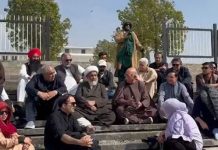HARIPUR, Jul 18 (DNA):The Consumer Court Haripur on Thursday prohibited the Tehsil Municipal Administration (TMA) Khanpur from collecting taxes for car parking, jetty boat stands, parasailing, or any other activities, in response to a petition filed by the President of the Boats Association Khanpur.
In the petition submitted by President of the Boats Association Khanpur Raja Hanif Kayani, to the Consumer Court Haripur, it was argued that Khanpur Dam is owned by the federal government department WAPDA. The TMA has neither obtained an NOC from WAPDA for tax collection nor have WAPDA and TMA provided any facilities for tourists at Khanpur Dam.
The petition stated that the victims of Khanpur Dam have initiated tourism activities at the dam on their own. However, the TMA staff, through threats and pressure, is collecting millions of rupees in taxes monthly. Despite this, TMA has not provided even basic facilities such as restrooms or benches at the dam.
The petition also made WAPDA and TMA parties to the case. The renowned lawyer Raja Yasir Ayaz Kayani is representing the Boats Association President in this case. After the initial hearing, the Consumer Court has ordered TMA Khanpur to stop collecting any kind of taxes at Khanpur Dam and has issued notices to the relevant parties.
While talking to APP, Raja Yasir Kayani revealed that Khanpur was declared a Tehsil in 2018, and TMA Khanpur began imposing taxes illegally in 2020 on jetty, parking, and other activities. Each year, the taxes have been increased.
He disclosed that the local PTI leadership, through the Excise Department, has verbally declared a 300-ft commercial area around Khanpur Dam and imposed taxes at rates of 7 percent and 15 percent. The president stated that when he asked the officials for a notification regarding the imposition of these new taxes, they refused and said that the order would be provided by the Peshawar office.
Raja Yasir Kayani stated that the collection of taxes from the Khanpur Dam area is entirely illegal as the land belongs to WAPDA. He affirmed that they would contest the case in the court of law to uphold their rights.

















